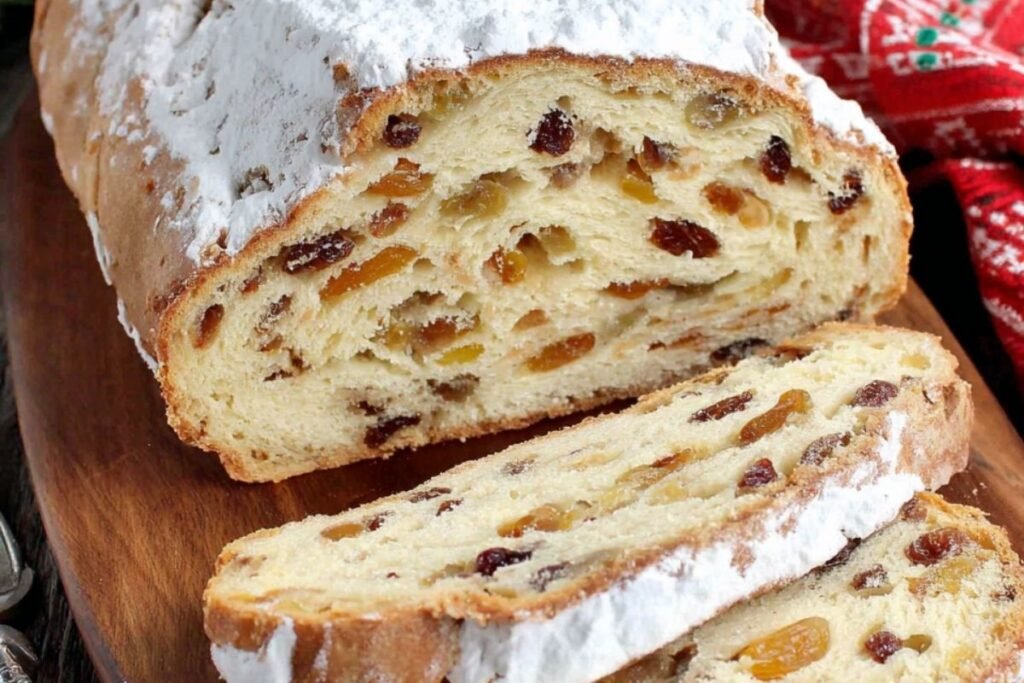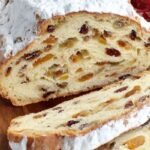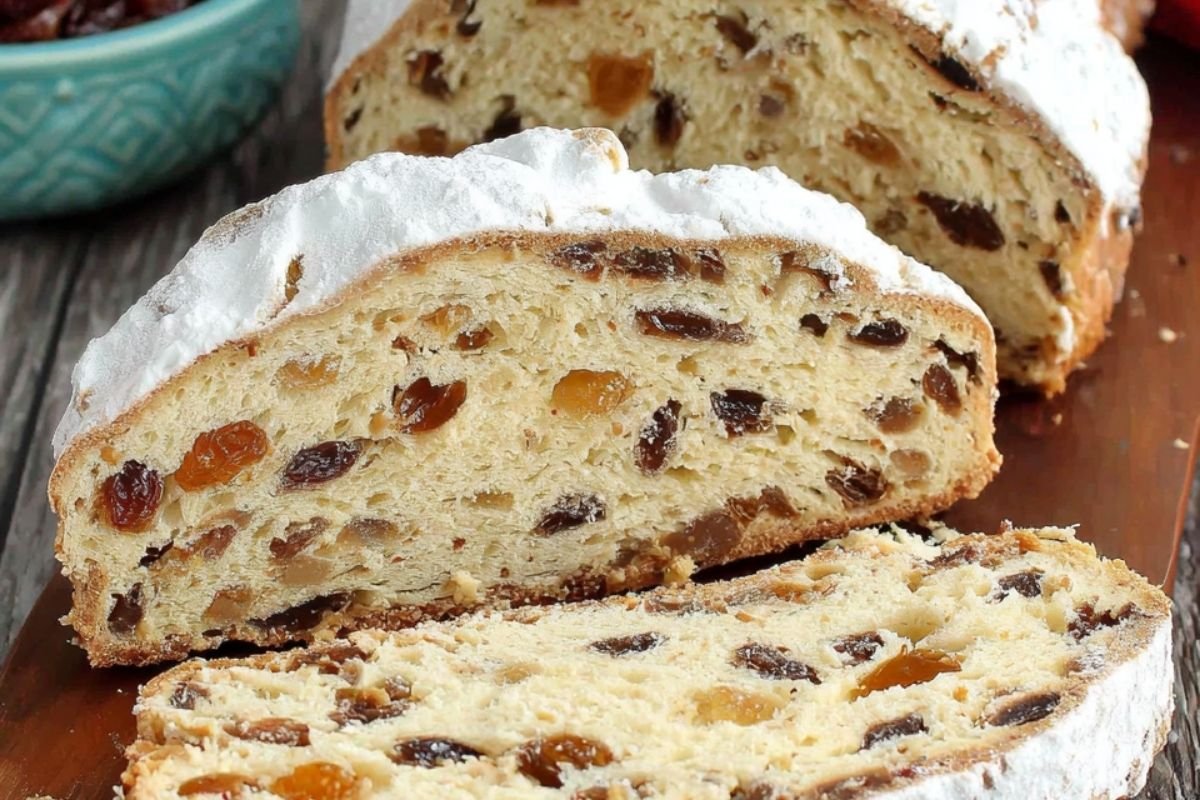If there’s one Christmas bread that perfectly embodies the spirit of the holidays in Germany, it’s the legendary German Stollen. Known for its dense texture, rich buttery flavor, candied fruits, marzipan center, and a generous snowy coating of powdered sugar, this bread has been baked for centuries to celebrate the festive season.
Whether you’ve seen it in stores during December or heard it mentioned in German traditions, German Stollen is more than a loaf—it’s a culinary heirloom, steeped in tradition, bursting with flavor, and perfect for gifting or enjoying with a warm drink by the fire.
In this ultimate guide, we’re diving deep into everything you need to know about baking and enjoying German Stollen at home. From its ancient history to a step-by-step recipe, handy tips, fun variations, aging secrets, and expert FAQs, this post gives you everything you need to master one of the world’s most iconic holiday treats.
Table of Contents
- What Is German Stollen?
- The Rich History of German Stollen
- Key Ingredients Explained
- Step-by-Step Baking Instructions
- Variations of German Stollen
- How to Store, Age, and Serve It
- Troubleshooting and Baker’s Tips
- FAQs About German Stollen
- Conclusion
1. What Is German Stollen?
German Stollen—also called Christstollen or Weihnachtsstollen—is a traditional Christmas fruit bread that originates from Germany, especially the Dresden region. It’s known for its dense, buttery crumb filled with candied orange peel, raisins, nuts, and often a sweet marzipan core.
The bread is folded to resemble the shape of a swaddled baby Jesus, dusted thick with powdered sugar, and meant to be aged for 1 to 2 weeks before eating. This process allows the flavors to deepen, the fruit to soften, and the sugar to seal in the moisture.
Unlike fruitcakes, which are sometimes cloyingly sweet or soaked in alcohol, German Stollen strikes a delicate balance between sweet, spicy, and bready.
2. The Rich History of German Stollen
A Bread of Fasting Turned Festive
German Stollen has roots going all the way back to the 15th century. The early versions were quite plain—made only with flour, oats, and water—because the Catholic Church prohibited butter during the Advent fasting period.
However, the tale of the Stollen takes a turn with the famous “Butter Letter.” In 1491, Pope Innocent VIII allowed Saxon bakers to use butter during Advent, changing the recipe forever. From that point on, the bread became much richer and more festive, symbolizing celebration instead of sacrifice.
Dresden: The Birthplace of the Iconic Stollen
By the 16th century, Dresden had become the official capital of Stollen baking. Bakers began to give Stollen as gifts to royalty. In 1730, the Elector of Saxony, Augustus II the Strong, commissioned a giant Stollen weighing over 1.8 tons! This event marked the beginning of the Dresdner Stollen Festival, which is still celebrated today with parades and ceremonial loaves.
To this day, only Stollen baked in Dresden by licensed bakeries may carry the title “Dresdner Christstollen.”
3. Key Ingredients Explained
Let’s break down what gives German Stollen its signature flavor and structure.

- All-purpose flour: Forms the base of the dough.
- Instant or active dry yeast: Makes the bread rise.
- Milk: Adds moisture and tenderness.
- Unsalted butter: Essential for richness and flavor.
- Granulated sugar: Provides sweetness and feeds the yeast.
- Salt: Enhances flavor and balances sweetness.
- Ground spices: Typically cinnamon, nutmeg, and cardamom. These warm spices give it that classic holiday aroma.
- Eggs: Help bind the dough and add richness.
- Raisins and golden raisins: Provide chew and natural sweetness.
- Candied orange and lemon peel: Adds citrusy brightness.
- Chopped almonds: Offer crunch and balance the fruit.
- Marzipan (optional): A sweet almond paste placed in the center for a decadent twist.
- Melted butter & powdered sugar (for finishing): The double coating locks in moisture and gives the bread its snowy, festive look.
4. Step-by-Step Baking Instructions
Step 1: Soak the Fruits
In a bowl, combine:
- 1 cup raisins
- 1 cup golden raisins
- ½ cup chopped candied orange peel
- ½ cup chopped candied lemon peel
- ½ cup orange juice or apple juice
Let this mixture soak for at least 4 hours, preferably overnight. This helps plump the fruit and enhance the flavor.
Step 2: Prepare the Dough
In a large bowl, combine:
- 1 packet (2¼ tsp) active dry yeast
- ½ cup warm milk (about 110°F)
- 1 tablespoon sugar
Let sit for 5–10 minutes until foamy.
Add to the yeast mixture:
- ½ cup sugar
- ½ teaspoon salt
- 1 teaspoon cinnamon
- ¼ teaspoon nutmeg
- ¼ teaspoon cardamom
- 2 large eggs
- ¾ cup softened butter
- 4 cups all-purpose flour
Mix until a soft dough forms. Knead for 8–10 minutes until smooth and elastic.
Step 3: Add Fruit and Nuts
Drain the soaked fruits and pat dry with paper towels. Fold them into the dough with:
- ¾ cup chopped almonds
Mix well until evenly distributed.
Step 4: First Rise
Place dough in a greased bowl, cover with a towel, and let rise in a warm place until doubled—about 1.5 to 2 hours.
Step 5: Shape the Stollen
Turn out the dough onto a floured surface. Divide it in half if making two loaves.
Flatten into an oval. If using marzipan, roll a 7-inch log and place it in the center. Fold one side over to create the traditional shape.
Step 6: Second Rise
Place the shaped loaves on a parchment-lined baking sheet. Cover and let rise for 45–60 minutes until slightly puffy.
Step 7: Bake
Preheat oven to 350°F. Bake for 30–40 minutes or until golden and cooked through.
Step 8: Butter and Sugar Coating
While still warm, brush loaves with:
- ½ cup melted butter
Then generously dust with:
- 1½ cups powdered sugar
Let cool completely, then wrap tightly in foil or plastic wrap.
5. Variations of German Stollen
There are many different versions of German Stollen, depending on the region and the baker’s taste.
- Marzipan Stollen – Filled with sweet almond paste. A modern favorite.
- Quarkstollen – Uses German quark cheese instead of yeast, creating a moist, cake-like texture.
- Nusstollen – Filled with a nut and spice mixture, often hazelnuts or almonds.
- Mohnstollen – Poppyseed-filled and more common in Eastern Germany.
- Vegan Stollen – Swaps out dairy and eggs for plant-based alternatives.
- Mini Stollen bites – Perfect for parties or gifting.
6. How to Store, Age, and Serve German Stollen
Storing
Wrap the cooled Stollen tightly in parchment paper and foil. Store in a cool, dry place (not the fridge).
Aging
Aged Stollen tastes better! Let it rest 3–14 days before slicing. The flavors deepen and the bread becomes more tender.
Freezing
German Stollen freezes beautifully. Wrap well and store for up to 3 months. Thaw at room temperature.
Serving
Slice about ½-inch thick and enjoy with tea, coffee, or warm cider. It’s best served at room temperature.
7. Troubleshooting and Baker’s Tips
Dough not rising? Check the freshness of your yeast and make sure your milk isn’t too hot.
Dry Stollen? You may have overbaked it. Always coat generously with butter and sugar after baking.
Fruit sinking? Toss your fruit in a bit of flour before mixing into the dough.
Want more flavor? Age the Stollen for at least a week before serving.
Not sweet enough? Don’t worry—the sugar coating does the trick.
8. FAQs About German Stollen
Q: Is Stollen the same as fruitcake?
A: No. Stollen is a yeasted bread with a tender crumb and subtle sweetness, unlike dense, often overly sweet fruitcake.
Q: Can I make Stollen without marzipan?
A: Absolutely. It’s traditional, but many people prefer it without.
Q: Can I make it alcohol-free?
A: Yes! Use fruit juice or even tea to soak the fruit.
Q: Why does it need to age?
A: Aging allows the flavors to develop and the bread to become softer and more moist.
Q: How long does Stollen last?
A: Properly stored, it can last 2–4 weeks. Some even say it gets better with age.
9. Conclusion
German Stollen isn’t just a holiday dessert—it’s a centuries-old tradition that blends history, flavor, and family warmth in every slice. With its buttery dough, aromatic spices, sweet fruits, and snowy coating, Stollen transforms the everyday into something truly magical.
Whether you’re a first-time baker or a seasoned pro, this comprehensive guide gives you everything you need to make your own authentic German Stollen—just like the famous loaves from Dresden.
Bake it, age it, slice it, and share it. From your kitchen to the Christmas table, may every bite bring joy, tradition, and the taste of a German holiday classic.
Print
Authentic German Stollen: The Ultimate Guide to Baking German Christmas Bread 🎄
Ingredients
-
4 cups all-purpose flour
-
2¼ tsp (1 packet) active dry yeast
-
½ cup warm milk (110°F)
-
¾ cup unsalted butter, softened (plus ½ cup melted for brushing)
-
½ cup granulated sugar
-
½ tsp salt
-
1 tsp ground cinnamon
-
¼ tsp ground nutmeg
-
¼ tsp ground cardamom
-
2 large eggs
-
1 cup raisins
-
1 cup golden raisins
-
½ cup candied orange peel
-
½ cup candied lemon peel
-
½ cup orange juice or apple juice (for soaking fruit)
-
¾ cup chopped almonds
-
7 oz marzipan (optional, for filling)
-
1½ cups powdered sugar (for coating)
Instructions
-
Soak the Fruit:
Combine raisins, golden raisins, candied orange and lemon peel with orange juice in a bowl. Let soak for at least 4 hours or overnight. Drain and pat dry. -
Activate the Yeast:
In a large mixing bowl, dissolve the yeast in warm milk with 1 tbsp sugar. Let sit for 5–10 minutes until foamy. -
Mix the Dough:
Add sugar, salt, cinnamon, nutmeg, cardamom, eggs, softened butter, and flour to the yeast mixture. Mix to form a soft dough. Knead for 8–10 minutes until smooth and elastic. -
Add Fruit and Nuts:
Fold in the soaked fruits and chopped almonds until well distributed. -
First Rise:
Place dough in a greased bowl, cover with a towel, and let rise in a warm place until doubled in size (about 1.5–2 hours). -
Shape the Stollen:
Turn dough out onto a floured surface. Flatten into an oval. Place a rolled log of marzipan in the center if using, then fold one side of the dough over to create the traditional shape. -
Second Rise:
Transfer to a parchment-lined baking sheet. Cover and let rise again for 45–60 minutes. -
Bake:
Preheat oven to 350°F. Bake for 30–40 minutes until golden brown and a toothpick inserted comes out clean. -
Finish with Butter and Sugar:
Brush hot Stollen with melted butter and generously dust with powdered sugar. Repeat for a thick coating. Let cool completely. -
Store & Age:
Wrap tightly in parchment and foil. Let rest in a cool place for 3–14 days to allow the flavors to mature.
